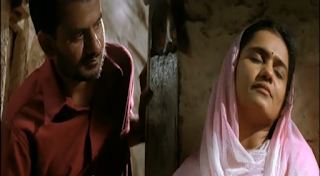It stands to reason that if you wre going to turn any of the three stories in Gandha (Marathi for 'smell', directed by Sachin Kundalkar) into a massive motion picture, it would have to be the first one, titled "Bride-to-be". It's the sole feel-good story of the bunch, and has comedic elements to it - but at the heart of it there is one woman's independent quest for love, which she finds through the strangest means: mainly, her sense of smell.
Sound familiar? Of course, the director re-made this first story into the colourful and over-the-top Aiyyaa, which I loved and have discussed previously. The bride-to-be Veena in the original version is played by the young actress Amrut Subhash, who fits this subtle version of the story well. Her colleague is played by Anita Date, who essays the same role in Aiyyaa. Veena, just like Meenakshi, is being married off enthusiastically by her parents, and she's reluctant to agree to any matches, but plays the part of a bride-to-be to please her family.
Although the films share tone and the basic story structure, there are differences, too. The object of her obsession is not South Indian, but Marathi just like her, and the colorism gets explored not by her desire for a dark man, but by Veena's mother's complaining to her shrine that her dark daughter will never be married. (Quizzically, this gets overshadowed by odd skin lightening creme product placement..)
You can easily see why the director was so eager to expand this story and explore this character and her story some more. Of course, the result was a completely different movie, and it's a matter of taste whether one prefers the short, subtle and sweet tale of Veena to the story of Meenakshi - louder, more song-filled but still with those undeniably gorgeous quieter moments tucked in the longer running time. I personally happen to adore both versions.
After the subtle saccharine, the next story "A man on medicines" can be quite hard to watch at times. It's a terrifically acted small piece of human drama, about Sarang (Milind Soman), a man downing pills on the regular, whose ex-wife Raavi (the fantastic Sonali Kulkarni, who most Hindi film fans probably remember best from Dil Chahta Hai) comes to visit her. What follows are basically just discussions of his sickness, their relationship and her obsession with the odd smell she finds in the apartment.
In this segment Kundalkar decides to pay heavy-handed tribute to Wong Kar Wai and Pedro Almodovar by having Sarang watch their films in some scenes. The tributes are probably heartfelt but don't necessarily add much to this piece of the film, as it excels more as simple human drama; big emotions in a small milieu.
There's a lot of beauty in Sarang's luxurious-looking apartment, but at times it's hard to find much relevance in the lingering shots of these surroundings. It's almost like this part of the film was meant to be a stage play, so we as audience would be forced to focus on the crux of the whole thing: the two characters, interacting. I don't want to tell you too much about the story, as it's best to watch it unfold as it slowly does.
Sonali Kulkarni, where art thou? It appears her filmography hasn't been empty since 2001, she's just managed to avoid my radar because of the kinds of films I've been selecting to watch. Being Marathi herself, she's done a bit of Marathi cinema alongside some Hindi indie fare, but aside from the Hindi Singham, not much that seems to have pushed through the mainstream. It's a shame, really, because she's a good actress - in here, as well as pretty much everything I've seen her in.
The final story ("Woman who sits aside") in the film portrays Janaki (Neena Kulkarni), a childress married woman having her period while her sister-in-law gives birth in the house. Because of cultural sanitary restrictions, she's not supposed to touch or even be close to other family members, or do the usual house chores, and her isolation is pretty painful to witness. It's also raining heavily, so she's stuck inside, alone, at least until her nephew begins communicating with her.
Potentially the most dull story within the film is brought to life by Neena Kulkarni's engaging performance. None of the stories are necessarily tied together by the end of the film. I think it does the film well to leave its theme so open for audience to draw their own conclusions. Our sense of smell is tied to strong memories, and yet it's one we rarely consider at all, other than when trying to eliminate it in its unwanted forms.
The second and third stories would make good full-length films, I believe, with a little more backstory added to each of their characters and with the tone kept as close to the original as possible. I'd especially like to see a longer, expanded version of the second story, but I'm not sure what the director's future plans involve. Certainly remaking "Bride-to-be" into Aiyyaa was an inspired move, and based on these two films, I hope Sachin Kundalkar does continue making films - it seems he's got a lot to offer.
(I watched the film legally on the Youtube Channel RajshriMarathi, and the video included good English subtitles so check out if you can, too.)






3 comments:
Since it's a very different style of story, I'm guessing that Anita Date is not saddled with those ridiculous fake buck teeth in Gandha?
I honestly don't recall. She's only in like 2 scenes, so she might have them..
Worth checking out, though!
great article
thanks for sharing
Post a Comment